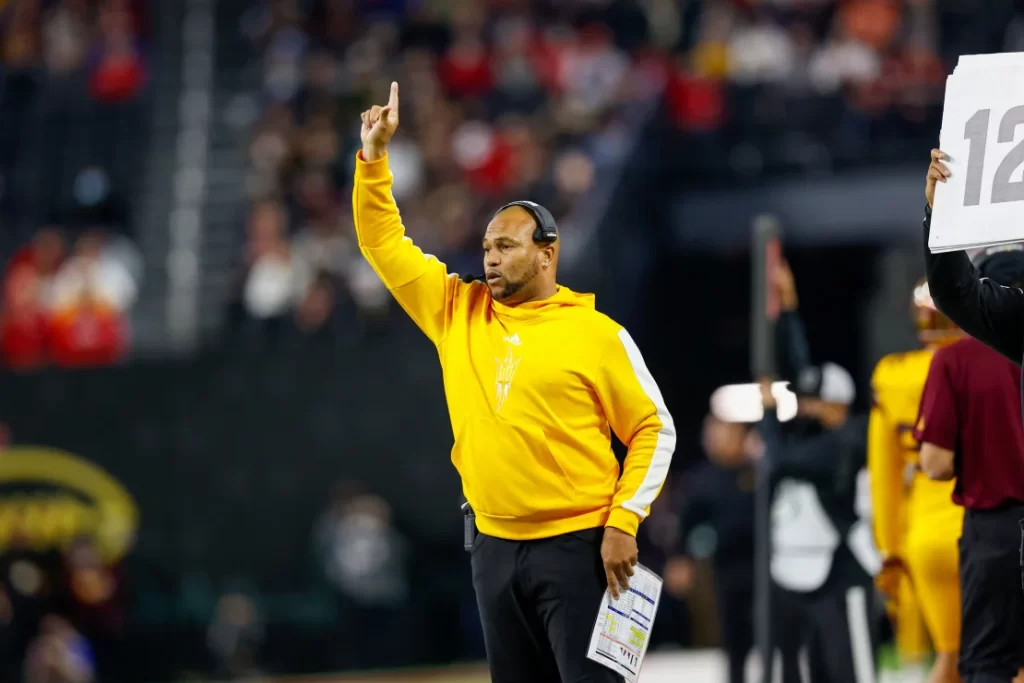NCAA Report Details Allegations Against Raiders Coach Antonio Pierce
3 min read
The NCAA has accused Antonio Pierce of recruiting violations while coaching at Arizona State University. Jordon Kelly/Icon Sportswire/Getty Images

The NCAA has accused Antonio Pierce of recruiting violations while coaching at Arizona State University. Jordon Kelly/Icon Sportswire/Getty Images
Antonio Pierce, the current head coach of the Las Vegas Raiders, has been implicated in a series of serious recruiting violations during his time as an assistant coach at Arizona State University (ASU). According to a recent NCAA infractions report, Pierce offered enticing perks to potential recruits and their parents, including trips to a strip club and a gun range, while serving in various roles at ASU from 2017 to 2022.
Pierce’s activities have drawn the attention of the NCAA, which outlined a year-long scheme involving multiple violations. The report claims he was the driving force behind these actions while acting as both associate head coach and recruiting coordinator. Although Pierce is now coaching in the NFL, the sanctions levied against him include an eight-year show-cause order and a one-season suspension should he return to college coaching. However, these penalties will not impact his current position with the Raiders.
As of now, CNN has sought comments from Pierce, the Raiders organization, and ASU regarding the allegations. In response to the NCAA’s findings, Pierce has consistently denied any involvement in planning or facilitating the visits, as well as providing illicit inducements or participating in prohibited out-of-state contacts.
The NCAA’s 67-page report details multiple instances where Pierce allegedly engaged in recruiting violations. Alongside former ASU defensive analyst Anthony Garnett and ASU staff members, as well as booster Regina Jackson, Pierce is accused of orchestrating unofficial visits for prospective recruits during the NCAA’s “dead period” in 2020 and 2021, a time when such activities were strictly forbidden due to the COVID-19 pandemic.
While the NCAA reported that Pierce did participate in an interview with their enforcement staff, they indicated he did not fully cooperate during the investigation, particularly regarding the unauthorized visits both in Arizona and out of state. The report paints a picture of Pierce as the “ringleader” of this scheme, pressuring staff members to offer illegal incentives like airfare, lodging, meals, and entertainment to 35 prospects and their families across approximately 20 occasions.
The NCAA quoted Pierce’s own admissions, revealing his awareness of the rules: he acknowledged he “knew about the rules, tried to keep up with the Jones[es],” and “broke the rules to do it.” This acknowledgment highlights his role as the “quarterback” of the operation, compelling less experienced staff to engage in violations.
The report also notes that several staff members expressed fears of losing their jobs if they did not comply with Pierce’s directives to bring recruits to campus during the dead period. This behavior demonstrates not only a blatant disregard for NCAA regulations but also a lack of consideration for the well-being of his subordinates.
Furthermore, the NCAA provided specific examples of alleged misconduct, including instances where Pierce reportedly met with recruits and their families at off-campus residences, as well as arranging trips to a local gun shooting range and a gentlemen’s club. The implications of these actions are significant, as eight recruits who participated in these unauthorized visits later played in 19 football games while ineligible.
As the Raiders prepare to face the Denver Broncos this Sunday, the scrutiny surrounding Pierce continues. The ongoing developments related to this case underscore the challenges faced by athletic programs in adhering to NCAA regulations and the lengths some individuals may go to in pursuit of top talent.
With Pierce now in the spotlight for these allegations, it remains to be seen how this situation will unfold and what implications it might have for his current role and the broader context of college athletics.